Carlos Roberto Liboni
Independent Consultant
Op-AA-23
Denationalization of ethanol? Just another step in the evolutionary process of a star
“Changes never occur without inconveniences, even in going from worst to best.” Richard Hooker.
It is the so very much Brazilian, formerly called “alcohol”, nowadays called “ethanol”, which from a domestic player evolved to be an international player of the energy matrix of the future, that supposedly was tested as vehicle fuel in 1922. Fifty years later, it presented itself as a domestic solution for Brazilian problems related to oil, or rather, the lack of it, in the early seventies.
It went through ups and downs to, at the beginning of this century, become a global celebrity. Of course, being a rising star, it has been courted by the most attentive interests of the international economic jet set, while having previously been submitted to other phases of a natural transformation process, such as mergers and acquisitions that began with the Cosan case.
One should bear in mind that this interest in Brazilian commodities and their closest “next of kin” is not exclusive of ethanol, based on information of IPEA (Applied Economic Research Institute), according to which, in the primary sector, its share of foreign investments in Brazil increased from 2% to 14% in a little more than 5 years.
Nowadays, ethanol occupies all tribunes, as if its “denationalization” were an act of treason. I concur that many arguments are valid and should be reason for concern, especially in the future economic scene, but I prefer to look at the phenomenon from a positive angle. If we can put up with the possibilities, we may enjoy significant gains for the industry.
This movement immediately provides some evident benefits. The first is the oxygenation of typical business management, through the accumulated experience of these major players in commodities in the international scene, followed by the power to invest of the neo-interested party “Big Oil” and the resulting influx of capital.
For quite some time the industry has tenaciously been seeking to position the product as an international commodity. And not only recently. Dedication is just as big as are the difficulties. Protectionism, concerns about infrastructure fragility and culture are truly obstacles difficult to overcome. In this respect, “denationalization” is by far the winner, given that it is sup-ported by a strong lobby, infrastructure available for distribution and lots of credibility of what is a “multinationalized” industry.
I see initiatives occurring in parallel, such as that of the EPA - Environmental Protection Agency, which, in its standard RFS2, acknowledges the sustainable superiority of ethanol from cane, creating consumption expectations of 45 billion liters of biofuel even in 2010; the initiative of CARB - California Air Resource Board, which refers to consumption in that state of 24 billion liters.
Both reflect a new concept for the industry. This credibility will surely leverage the consolidation of ethanol as a commodity, increasing Brazilian presence in the international economic scene through the manifestation of its leadership in technology and production. In addition, one should mention Brazil’s gain from a technological point of view.
Even being the leader in first generation ethanol, the country is still far from the technological progress of developed countries, looking to the commodity’s second generation. Knowing that our capacity to invest in technology in Brazil is institutionally outdated by 50 years, it is good to count on the assistance of the new partners.
To illustrate this gap, while President Lula, in a commendable way, inaugurates a research center for second generation ethanol in Campinas, the U.S. company Coskata is already licensing its technology for the production of the commodity. Therefore, it is also reason for relief to know that Shell is bringing two companies to the group, which are leading this research, placing them under the Cosan joint venture umbrella, according to recent media reports.
In summary, I prefer to view Brazil as a future investor in the production of the new commodity outside the country, aggregating value through the transference of technology, which is firmly detained by our technicians and managers, rather than see it in the hands of someone willing to lose the rings rather than the fingers.
Like I commented above, I believe one must look at the risks. For instance, not forget that the future will submit the payment bill in the form of profit remittances, which, by the way, are tax exempt when made to investors’ home offices. Irrespective of the inconveniences of change to how the industry is structured, the fears change brings about in workers and the controversies it creates in society, such change, apart from being inevitable, may be highly beneficial for business if we know how to deal with its variables optimistically and with somewhat more good faith.




